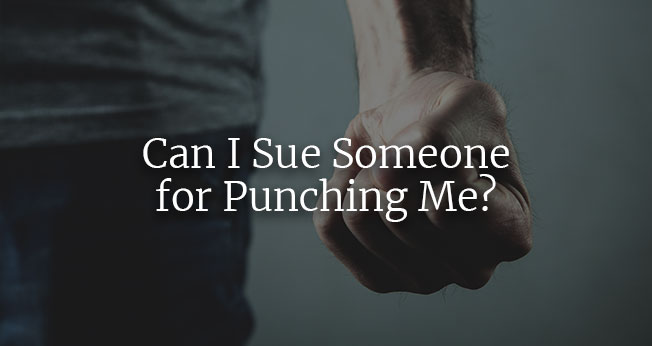Can I Sue Someone for Punching Me?
When an altercation gets physical, serious injury can occur. In the same way a victim of a car accident can sue the party responsible for their injuries, the victim of an assault may be able to sue the person who assaulted them in order to collect compensation for medical bills, lost wages, and other distress. However, the question must be asked, can they afford to pay for this? Most personal injury lawyers will not accept a case if there is no “collectable defendant”. A collectable defendant is someone who has the money to pay for the damages they caused the plaintiff who is suing them. If they have no money or assets, there is no money to collect.

What Counts as Assault?
Acts of assault can include intentionally applying force, such as hitting or shoving, or attempting to apply force, even if no contact is made. Deliberate action is necessary; accidentally bumping into someone would not be considered assault. Even if the force was intentional, however, there could be a question of consent, such as in the case of a contact sport like wrestling or football. It may be determined that the victim understood force would occur but agreed to play anyway, weakening an accusation of assault. As with all cases, circumstances are considered individually.
Either a civil or criminal case can be claimed for assault. These cases are separate and do not affect one another; an individual can sue for damages and press criminal charges. In criminal cases, depending on the severity of the injury, the accused could face jail time, fines, community service, or probation. While civil cases typically seek monetary damages, a victim should keep in mind the accused, even if liable, can challenge the numbers he or she is sued for. There should be a clear reason for the amount claimed.
Once a lawsuit is won, the victim can record the judgment with the local record office. If the guilty party ever tries to get a bank, mortgage, or car loan, the judgment will show up on his or her credit report, making it difficult to obtain the money needed. Even if the guilty party comes into money years from the case ending, the victim may have the right to levy his or her assets. The value of the judgment could have doubled or tripled, allowing the victim to obtain the full amount claimed with any accrued interest.
Four types of abuse or harassment in civil cases:
- Domestic violence
- This is considered if the accused and victim are either married or domestic partners, divorced or separated, dating or used to date, living together or used to live together (more than roommates), or closely related (i.e., parent and child, siblings, or grandparents).
- Elder or dependent assault
- This can occur if the victim is 65 or older, or with a dependent adult between the ages of 18 or 64 who is incapable of caring for themselves due to a physical or mental disability.
- Civil harassment
- This happens with individuals who do not have a close family relationship and have never been romantically involved. This includes roommates, neighbors, friends, or non-immediate family members.
- Workplace violence
- These cases are qualified similarly to civil harassment, but must occur in the workplace. If an employee has been assaulted or feels threats of assault at work, he or she can get a workplace violence restraining order.
Assault can occur in any situation. If you are a California resident and you have questions, feel free to contact our office to discuss your situation. Our San Diego injury lawyers will help you determine if taking legal action is in your best interest.

